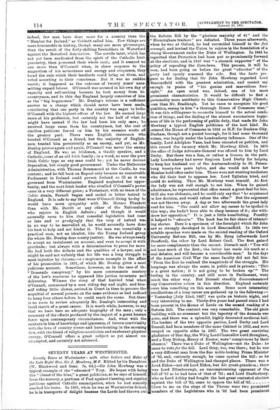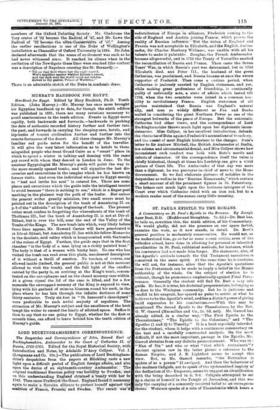SEVENTY YEARS AT WESTMINSTER.
Seventy Years at Westminster : with other Letters and Notes of the Late Right Hon. Sir J. Mowbray,M.P. Edited by his Daughter. (W. Blackwood and Sons. 7s. 6d.)—Sir John Mowbray was a typical example of the " educated " Tory. He began with being the "bluest of the blue," a great politician, as he says of himself, from the nursery, a partisan of Peel against Canning, and signing petitions against Catholic emancipation, when he had scarcely reached his teens. In 1831, when he was at Westminster School, he is in transports of delight because the Lords had thrown out
the Reform Bill by the "glorious majority of 41" and the "Birmingham traitors' are defeated. Three years afterwards, when he was at Oxford, he bad reconciled himself to the fait accompli, and invited the 'Onion to rejoice in the foundation of a strong Government under the Duke of Wellington. In 1841 he regretted that Protection had been put so prominently forward at the elections, and in 1846 was "a staunch supporter" of the policy of repealing the Corn-laws. This process, it will be seen, had been going on before the great " educator " of the party had openly assumed the role. But the facts pre- pare us for finding that Sir John Mowbray regarded Lord Beaconsfield with the greatest admiration, and cannot say enough in praise of "his genius and marvellous fore- sight." An open mind was, indeed, one of his most prominent characteristics. It would be difficult to find ri personality more antithetic to this Conservative High Church- nan than Mr. Bradlaugh. Yet he came to recognise his good qualities, seeing in him "a thorough House of Commons man." It was this willingness to reconcile himself to the actual condi- tion of things, and the finding of the almost unconscious happi- ness of life in the performing of public duty, that made Sir John aIowbray a typical English politician of the best kind. He entered the House of Commons in 1853 as M.P. for Durham City. Durham, though not a pocket borough, for it had some thousand voters, was largely under the Londonderry influence. One of the family, Lord Adolphus Vane, had been unseated on petition, and this caused the vacancy which Mr. Mowbray filled. In 1858 the office of Judge Advocate-General was offered to him by Lord Derby. But there was a lion, or rather a lioness, in the path. Lady Londonderry had never forgiven Lord Derby for helping to keep her husband out of the Ambassadorship to St. Peters- burg twenty-two years before, and she would not have her Member hold office under him. There were not wanting mediators who did their best to appease her. Lord Eglinton tried, and could do nothing. Then Mr. Mowbray went himself. At first the lady was not well enough to see him. When he gained admittance, he represented that office meant a great deal for him. Still she was obdurate, and he could only say that "he acquiesced in her decision, and would refuse the offer." But the argument was not thrown away. A day or two afterwards the great lady sent for him. "She could not allow my career to be spoiled in this way; she hadn't been able to sleep because of it ; she with- drew her opposition." It is just a little humiliating. Possibly it helped to "educate." The book has its fair share of interest- ing stories. Here is a specimen of the foresight which Sir John saw so strongly developed in Lord Beaconsfield. In 1854 two notable speeches were made on the second reading of the Oxford University Reform Bill, one by Mr. Byng (afterwards Lord Strafford), the other by Lord Robert Cecil. The first gained far more compliments than the second. Disraeli said : "You will not hear much of the first ; the latter has made his mark as a real debater, and will become a considerable man." In the days of the American Civil War the same faculty did not fail him. "From the first he realised the magnitude of the struggle. His language was always the same, in public and in private : This is a great nation ; it is not going to be broken up." The feeling in the country, and still more in Parliament, went much the other way. But Disraeli steadily discountenanced any Conservative action in this direction. England certainly owes him something on this account. Some most interesting recollections of a long career are gathered up in the following:— " Yesterday [July 22nd, 1867] was quite an historic night, and very interesting to me. Thirty-five years had passed since I had been present in the House of Lords on the seceoad reading of a Reform Bill. The contrast was very remarkable. The old plain building with no ornament but the tapestry of the Armada was gone, and there was a splendid, highly decorated medieval hall. The leaders of the two opposite parties, Lord Derby and Lord Russell, had been members of the same Cabinet in 1832, and were ranged on opposite sides in 1867. The two great surviving gladiators of that day, the Whig Lord Chancellor Lord Brougham, and a Tory Bishop, Henry of Exeter, were conspicuous by their absence.' There was a Duke of Wellington—not the Duke : he came to vote for the bill. Lord Grey, too, was there; but he was a very different man from the fine noble-looking Prime Minister of '32, and, curiously enough, he came against the bill : so he and the Duke of Wellington had changed places. There was a Lord Eldon—not old Lord Eldon, but his great-grandson ; there was Lord Ellenborough, an uncompromising opponent of the bill of '67 as he had been of that of '32; and Lord Shaftesbury, who as Lord Ashley had fought the last great contested election against the bill of '32, came to oppose the bill of '67. . . . . . • Close to me on the steps of the Throne were two prominent members of the Legislature who in '32 had been prominent members of the Oxford Debating Society : Mr. Gladstone the Tory orator of '32 become the Radical of '67, and Mr. Lowe the Radical of "32 become the ultra-Conieriatife of '67." Among the earlier recollections is one of the Duke of Wellington's installation as Chancellor of Oxford University in 1834. .Sir John declared afterwards that the scene of excitement was such as he had never witnessed since. It reached its climax when in the recitation of the Newdigate these lines were reached (the context was a description of Napoleon crossing the St. Bernard)
Till on that field where last the eagle soared, War's mightier master wielded Britaba's sword, And the dark soul the world could not subdue Bowed to thy genius, Prince of Waterloo."
There is an admirable sketch of the Duke in academic dress.



















































 Previous page
Previous page